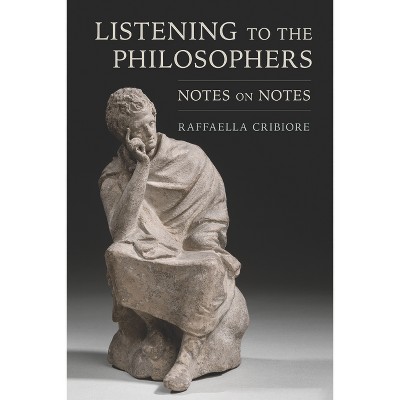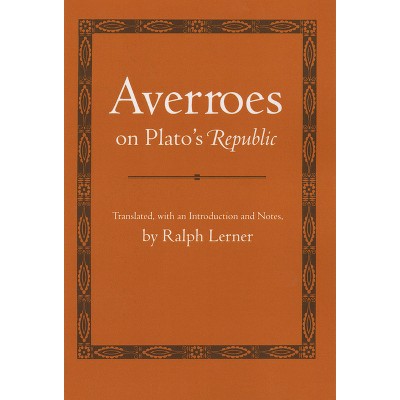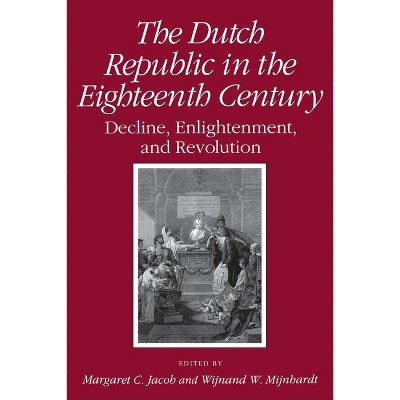Sponsored

Philosophers in the Republic - by Roslyn Weiss (Hardcover)
In Stock
Sponsored
About this item
Highlights
- In Plato's Republic, Socrates contends that philosophers make the best rulers because only they behold with their mind's eye the eternal and purely intelligible Forms of the Just, the Noble, and the Good.
- About the Author: Roslyn Weiss is Clara H. Stewardson Professor of Philosophy at Lehigh University.
- 248 Pages
- Philosophy, History & Surveys
Description
About the Book
In this smart and carefully argued book, Roslyn Weiss offers a new interpretation of Platonic moral philosophy based on an unconventional reading of the Republic.
Book Synopsis
In Plato's Republic, Socrates contends that philosophers make the best rulers because only they behold with their mind's eye the eternal and purely intelligible Forms of the Just, the Noble, and the Good. When, in addition, these men and women are endowed with a vast array of moral, intellectual, and personal virtues and are appropriately educated, surely no one could doubt the wisdom of entrusting to them the governance of cities. Although it is widely--and reasonably--assumed that all the Republic's philosophers are the same, Roslyn Weiss argues in this boldly original book that the Republic actually contains two distinct and irreconcilable portrayals of the philosopher.
According to Weiss, Plato's two paradigms of the philosopher are the "philosopher by nature" and the "philosopher by design." Philosophers by design, as the allegory of the Cave vividly shows, must be forcibly dragged from the material world of pleasure to the sublime realm of the intellect, and from there back down again to the "Cave" to rule the beautiful city envisioned by Socrates and his interlocutors. Yet philosophers by nature, described earlier in the Republic, are distinguished by their natural yearning to encounter the transcendent realm of pure Forms, as well as by a willingness to serve others--at least under appropriate circumstances. In contrast to both sets of philosophers stands Socrates, who represents a third paradigm, one, however, that is no more than hinted at in the Republic. As a man who not only loves "what is" but is also utterly devoted to the justice of others--even at great personal cost--Socrates surpasses both the philosophers by design and the philosophers by nature. By shedding light on an aspect of the Republic that has escaped notice, Weiss's new interpretation will challenge Plato scholars to revisit their assumptions about Plato's moral and political philosophy.
Review Quotes
In Philosophers in the 'Republic, ' Roslyn Weiss argues that Plato's Republic contains two 'distinct and irreconcilable' portrayals of the philosopher: what Weiss calls the 'philosopher by nature' and the 'philosopher by design.' Through close reading of the arguments and the dramatic action of the Republic, Weiss convincingly shows the distinctness of these two types while also educing a third: that of Socrates himself. Weiss illuminates the multifaceted arguments of the Republic anew with deft intelligence, calling attention to conspicuous absences as well as important inconsistencies that ought to shift conventional readings of the dialogue from any approach.
-- "Bryn Mawr Classical Review"This important book takes Plato at his word. Delicately attuned to nuances and alterations in Plato's language, Roslyn Weiss painstakingly--but never uninterestingly--accumulates convincing textual evidence in support of three main thesis: (1) The Republic contains two distinct and irreconcilable portrayals of the philosopher: the philosophers by nature of books five and six and the philosophers by design of book seven (chapters one through three); (2) Socrates is superior to both of these philosophical types because he displays the virtue, deliberately suppressed in the Republic, of piety (chapter four); (3) Socrates intentionally blurs the difference between the other-regarding virtue of justice and the self-regarding virtue of moderation (chapter five). These theses are internally connected by Weiss's guiding intuition that the example of Socrates, who puts himself in harm's way in the course of caring for the souls of others, furnishes the proper measure of philosophy and justice in the Republic.
-- "The Review of Metaphysics"Weiss develops her bold and refreshing alternative to standard interperetations of the Republic by way of close readings of the dialogue that attend with nuance to its language and arguments and also its dramatic structure. Weiss's exceptionally rich footnotes supplement the careful arguments of her text, while also offering, over the course of the book, a sustained set of insightful gestures to undernoted proximities between Plato and Aristotle.
--Jill Frank "The Review of Politics"What we expect from Roslyn Weiss is close textual argument and unusual readings. Her book on philosophers in the Republic does not disappoint.... The audacity of this close reading of the dialogue is a welcomed challenge to settled habits. Whether you agree with the conclusion or not, you will learn a lot about the text.
--Richard D. Parry "The International Journal of the Platonic Tradition"About the Author
Roslyn Weiss is Clara H. Stewardson Professor of Philosophy at Lehigh University. She is the author of The Socratic Paradox and Its Enemies, Virtue in the Cave: Moral Inquiry in Plato's 'Meno, ' and Socrates Dissatisfied: An Analysis of Plato's 'Crito.'












